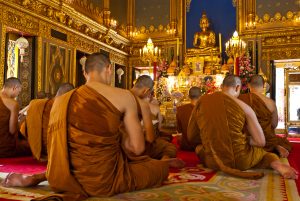Thailand’s approaching general election and persistent rumors of House dissolution – widely expected to take place after Prime Minister Prayut Chan-o-cha hosts the APEC summit later this month – have sent the country’s politicians into frenzy mode. The past several weeks have seen party switching, the unveiling of potential prime ministerial candidates (each party can nominate up to three names) and local MP candidates, and the publication of party policies. Unlike most other parties, which have given priority to addressing pressing economic challenges, the second largest opposition party, the Move Forward Party (MFP), which is well known for its progressive leftist stance, has introduced several “socio-political first” policies that seem to go against the ruling conservative establishment.
Some of the revisionist policies proposed by the MFP include reform to the lese majeste law (something that other opposition parties are not particularly keen to support), military revamp schemes such as the abolition of conscription in favor of a voluntary recruitment system, and the dissolution of Thailand’s Internal Security Operations Command, which has been around since the Cold War days. It has also called for all of Thailand’s 77 provinces to elect their own governors rather than getting figures appointed by the Interior Ministry.
Another striking MFP policy is a call to give voting rights to Buddhist monks. In principle, Thai monks on a mission to achieve spiritual liberation are not supposed to mingle in worldly affairs, especially in “dirty” matters like politics. They are thus barred from all forms of political participation. And although there are no laws that explicitly prohibit monks from speaking about politics, those who get “too expressive” are generally frowned upon by the Sangha Council and devoted Buddhist followers. The fact that Thai monks are free to leave monkhood and return to their normal lives at any time probably adds to the lack of tolerance towards outspoken political and celebrity monks.
But rising political awareness and human rights empowerment among younger generations, the MFP’s main base of support, as well as changes in neighboring Buddhist-majority countries like Bhutan and Cambodia over the past two decades, seems to have prompted rethinking among Thais about monks’ basic political rights.
Indeed, the MFP’s argument for monk suffrage is straightforward and rooted in human rights principles. Monks, too, are citizens of Thailand and if they are required to go through the conscription lottery event, whereby citizens who pick red ballot papers have to serve in the military for two years, then they should enjoy the basic right to cast votes (though there is a case to be made that granting military exemption to monks would only encourage many men to undergo ordination just to escape conscription).
Yet for many monks who have openly called for the right to vote, human rights concerns are arguably just a facade. According to Katewadee Kulabkaew, whose research focuses on the politics of Thai Buddhism, there exists a sizeable number of Thai monks who have sought to join the political sphere and have backed specific political parties “in the hope that a democratic government that comes to power with that support may realize their goal of recognizing Buddhism as Thailand’s national religion.” The said goal has consistently been rejected by authoritarian Thai administrations for reasons of national security.
Theravada Buddhism, despite being practiced by up to 95 percent of the Thai population, has never been endorsed as an official religion for a reason: to constitutionally guarantee religious freedom (the only person who enjoys no such freedom is the King, who is required by law to be Buddhist) and avoid alienating Thailand’s other faiths.
The question of whether Buddhism should be formally acknowledged as a state religion of Thailand has been the subject of longstanding debate. Monks who believe that Buddhism should be recognized as Thailand’s national religion, both under the constitution and in practice, are supported by many staunch Buddhist conservationists, who buy into the narrative that Buddhism is under threat, from commercialization, cultism, and foreign religions. As Katewadee further pointed out, these people have grown more supportive of monks’ political participation beyond simply just voting in polls if such participation can help preserve and purify Buddhism.
A scenario in which monks have the freedom not only to vote but also to run for office and create their own political parties, much like their Sri Lankan counterparts, is, without a doubt, a destabilizing one in the eyes of Thai authorities. This would set favorable conditions for the rise of radical monks or even the birth of Buddhist nationalist movements, and subsequently, deal a major blow to Thailand’s proclaimed practice of religious tolerance. Moreover, this could fuel the existing unease between Thai Buddhists and Muslims in the insurgency-wrecked Deep South.
The MFP’s policy proposal is, at this stage, exclusively about pushing for monks’ right to the ballot box. Nonetheless, this sheds further light on the broader context of the ongoing monkish politics in Thailand and underscores the inescapable tension between human rights and security.













